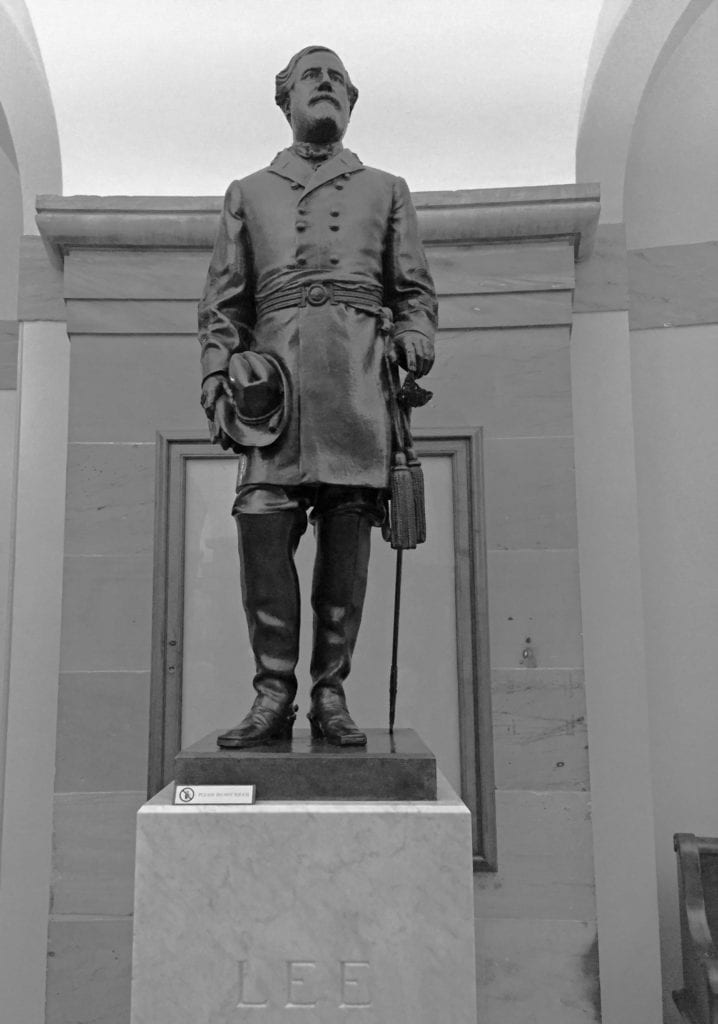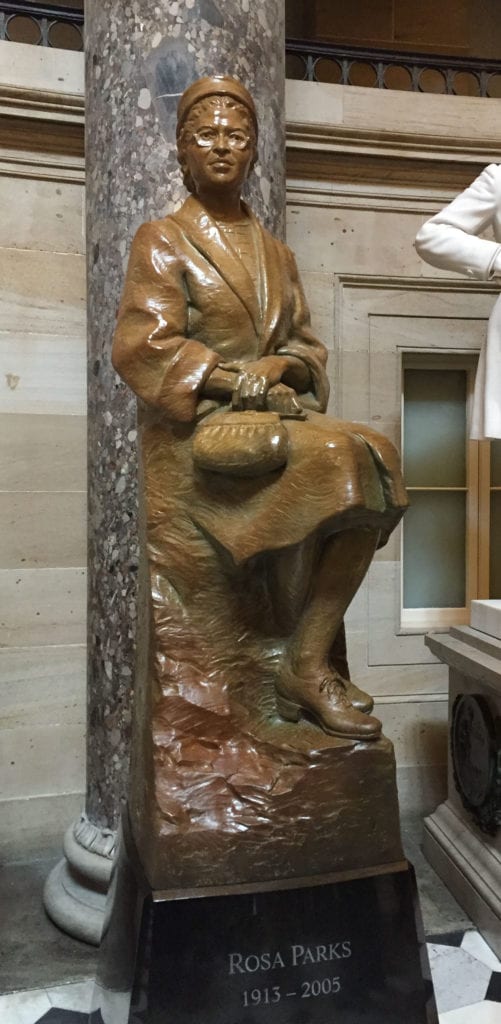
A statue of Confederate General Robert E. Lee stands in National Statuary Hall in the U.S. Capitol: Glynn Wilson
By Glynn Wilson –
WASHINGTON, D.C. — Thomas Jefferson’s home town of Charlottesville, Virginia has taken over the spotlight from New Orleans as the key battleground city in a new verbal civil war between activists on the left who want Confederate monuments removed from public property and neo-Nazi white nationalists who are fighting to preserve what they see as their “heritage,” a heritage of slavery and hate, according to the other side.
The two sides will converge on the town Saturday, August 12, where alt-right groups — which tend to be supporters and fans of President Donald J. Trump — have planned a “Unite the Right” rally to voice opposition to the decision by the town council to remove a prominent statue of Confederate General Robert E. Lee from a downtown park.
In New Orleans, news reports seem to indicate that things have calmed down after the city removed four statues of Lee, Confederate President Jefferson Davis, P.G.T. Beauregard and a Civil War monument at the Battle of Liberty Place.
But in Charlottesville, local officials are preparing for potential violence and property damage from Confederate supporters and the large crowd of counter-demonstrations expected by civil rights groups, faith-based organizations, faculty and students at the University of Virginia and even some local business owners and their employees.
“With large crowds of individuals with strongly held and potentially opposing beliefs, there is also the potential for conflict,” the city’s communications director Miriam Dickler wrote in a news release. “Those who live and work in the area of these events should exercise their best judgment on the day of the rally and should avoid the area if they have concerns.”
But in a brief survey of some of the activists involved, it has become clear that there is little knowledge of a potentially far more egregious public display of Confederate heritage — right in the center of federal power in Washington. A larger than life statue of Robert E. Lee, what one activist called “the biggest traitor against the United States government in American history,” is there for visitors from all over the world to see in the old House chambers in the U.S. Capitol building in what is now called National Statuary Hall.
States hold the power to make a gift of chosen statues, not individuals or groups. Congress also holds the power, carried out by the Architect of the Capitol upon the approval of the Joint Committee on the Library, with the advice of the Commission of Fine Arts. Find out more details here.
The newest addition is a memorial to Alabama’s Rosa Parks, the woman who refused to give up her seat on a Montgomery bus on December 1, 1955, by sculptor Eugene E. Daub. It wasn’t donated by the state of Alabama or Michigan, where she lived most of her life. It took a special act of Congress and is the only statue ever commissioned by Congress. Parks became the first African American woman to have her likeness in the Hall, although the statue is not part of the official collection.
The Lee statue has been there since 1934, when it was nominated by the old racist Virginia newspaper publisher and Senator Harry Byrd one year after he was elected in 1933.
Critics might ask: Is Lee really the most important Virginian in American history? The man tourists might want to see and learn about? What about Thomas Jefferson himself, who did more for political freedom, religious freedom and intellectual freedom than any other American? Jefferson wanted to be remembered as the author of the Declaration of Independence, the Virginia Statute on Religious Freedom and the founder of the University of Virginia.
The Jefferson Memorial and Legacy at Monticello in Autumn
When first confronted by the controversy in 2015, Virginia’s Democratic Governor Terry McAuliffe got behind a movement to remove the Confederate flag from a state license plate, but he waffled on removing the statues, saying it should be up to local communities. But when the state legislature passed a law in 2016 to prevent local governments from removing the statues, he vetoed the bill.
Virginia Senator Mark Warner, also a Democrat, has not taken a public stand on the issue. I asked his press staff for a comment on Thursday. There has been no official response yet. The state’s other Senator, Tim Kaine, Hillary Clinton’s choice for her vice presidential running mate, is being so inundated with calls about the statues right now that there is no way to get through for a comment. When those comments come in, we will add them to this report.
As an American journalist from the South, a true believer in this experiment in democracy, a citizen and a stakeholder in the success of this country’s mission, I ran across this statue on a recent tour of the Capitol. I asked the tour guide about it and whether there had been any controversy surrounding it’s placement. He stepped out of the frame and downplayed the Lee statue’s presence, spending more time talking about Rosa Parks.

A statue of Civil Rights hero Rosa Parks stands in National Statuary Hall in the U.S. Capitol: Glynn Wilson
Watch the Video —
Editorial View
As an editor and publisher and a former University Professor who lived and worked in New Orleans, fully capable of making up my own editorial mind, when I first heard about the escalation of the controversy, I was skeptical. “Why now?” I thought. Removing the monuments is not going to fix our broken health care system.
But the more I watched the coverage, the more I came to the independent conclusion that if the monuments in certain towns offend enough people and they demand to have them removed, and if they can win the votes of the local governments, they are in the right and the statues and monuments should be removed.
Germany does not celebrate the great “heritage” of Hitler. They do not fly the Swastika on public property. The loser in wars are rarely celebrated in this way, but the president who gave his life for the noble cause to keep the United States together, was sympathetic to the people of the South and wanted them to feel like they were part of the union too. Unlike the Nazi war criminals, the leaders of the Confederacy were not hunted down, tried and hanged. They were allowed to go back to their families.
If the new “neo-Nazis” want to fly the Swastika and the Confederate Battle Flag on their pickup trucks, they have every right under the federal Constitution to do just that. But our federal, state and local government institutions should not be honoring that side of this history on public property. That includes the U.S. Capitol.
If the activists want to elevate this fight to the national level and really strike a blow against this celebration of the so-called “honorable” nature of the Confederate uprising and what it represented, this statue should not stand in this place. Period.
The question is will the activists involved in this fight — and the press covering it — share this story and let the people know it’s there?
Related Coverage
Freedom of Speech Rallies Show Free Speech Alive and Well in America














The other statue from Virginia is George Washington. If not Thomas Jefferson, what about Booker T. Washington?
https://en.wikipedia.org/wiki/List_of_people_from_Virginia